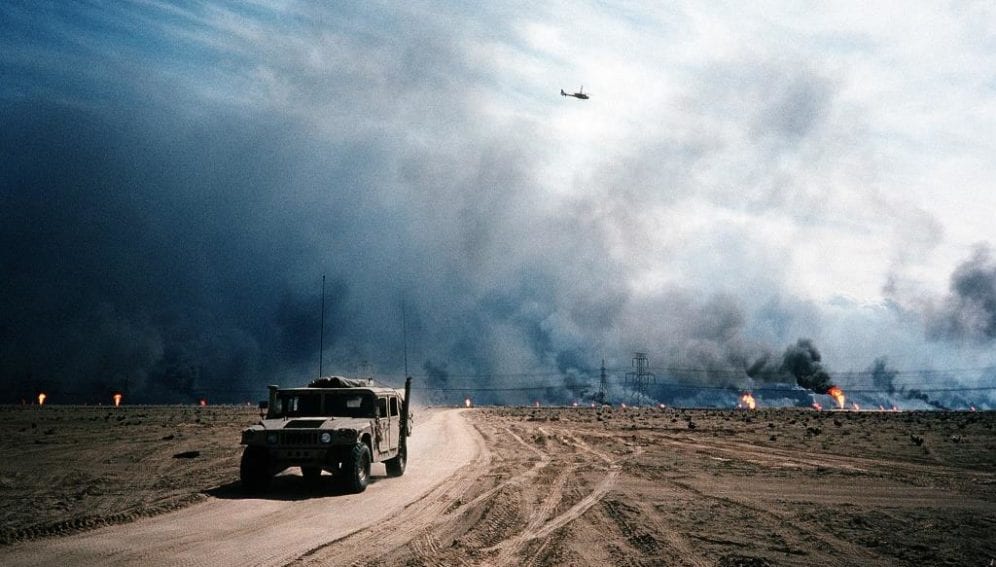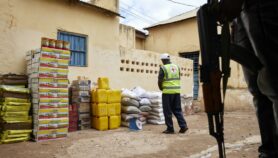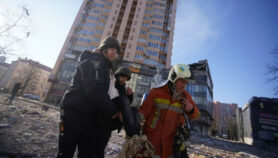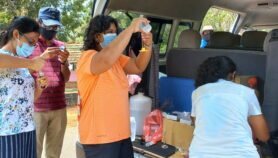By: Adel Fakhir
Send to a friend
The details you provide on this page will not be used to send unsolicited email, and will not be sold to a 3rd party. See privacy policy.
They said the adverse environmental and health consequences of the fighting that has been raging in Iraq's second-largest city since 17 October may extend to neighbouring countries, if the battles continue to escalate between members of ISIS and Iraqi forces supported by regional and international parties.
These battles resulted in serious damage, some of which arose when ISIS — which has been controlling the city for nearly two years — set fire to a number of oil wells and a sulphur factory in Qayyarah, bordering Mosul in the south. ISIS bombarded the factory with mortar shells to mislead hostile warplanes, which released toxic emissions that continued even after the fire was extinguished.
“These emissions show a humanitarian and environmental catastrophe, not only in the short-term, but in the long-term as well. They remain suspended in the surrounding environment for years and could destroy much of the botanical and zoological ecosystems, as well as cause serious health damage,” says Safaa Jayyousi, regional manager of climate & energy campaigns in the Arab world at IndyACT International Organization, an environmental group.
Shukri Hassan, an Iraqi environmental expert, clarified that the enormous amount of smoke from the fires, which he estimated at thousands of tons, carried high concentrations of carbon monoxide and dioxide that exceed the allowable limit for petroleum hydrocarbons. These emissions, as well as emissions of sulphur dioxide and nitrogen oxides, are extremely poisonous when inhaled at high levels, causing respiratory symptoms and disease, difficulty in breathing, and premature death.
“Wars have indirect effects that manifest later in the form of disasters, the most serious of which is the spread of deadly diseases which may end the life of more people than war itself.”
Al-Hassan, University of Basra
This impact extends beyond air exposure to exposure via the soil, Al-Hassan, head of the environmental research laboratory in the Faculty of Arts at the University of Basra, tells SciDev.Net.
“If rain falls soon in the region, it will turn to acid rain. The smoke particles, accumulated above the soil, would also have a subsequent impact by increasing the soil’s acidity, which will affect agricultural productivity in the future”, explains Al-Hassan.
Agricultural engineer Durgham Muhammad Ali expects that this will lead to severe damage to the agricultural sector in three provinces of the country — Nineveh, Kirkuk, and Salahuddin. “Acid rain and the toxins it carries will affect the soil chemistry, killing crops and plants, not to mention displacing tens of thousands of peasants and transforming the fields to wasteland.”
Durgham expects the impact of these emissions to extend to the neighbouring countries, should ISIS continue to burn oil wells, especially in the north-eastern regions of Syria and the cities of Raqqa and Deir ez-Zor. “There is a possibility that the effects even reach a province or two in Turkey.”
Al-Hassan added that military operations on the ground are expected to damage the infrastructure of the city. The facilities that could become affected include drinking water supplies and sewage treatment plants, “which indicates a serious environmental and health deterioration that threatens to spread germs, with associated outbreaks of several diseases.”
For these reasons, Al-Hassan believes that the government should prepare for such environmental scenarios alongside its plans for the ongoing battle. “Wars have indirect effects that manifest later in the form of disasters, the most serious of which is the spread of deadly diseases which may end the life of more people than war itself.”
As for attempts to prevent the spread of emissions, Durgham sees “air pollution as [an issue] beyond control"—referring to the United States’ inability to control the Kuwaiti oil fires in 1991 during the second Gulf War, and the subsequent acid rain impact on Kuwait, Iran, and Iraq.
Mohammed Jabr, assistant general manager of the Department of Public Health at the Iraqi Ministry of Health, tells SciDev.Net: “The Ministries of Health and Environment have taken the first steps to address the current disaster. They have initiated a damage assessment. But the battle of Mosul is still in its early days, and we expect further displacement, health and environmental problems to occur in the course of the evaluation.”
Jabr confirmed that the ministry will develop a plan, after the evaluation process, to address the health and environmental effects of the battle, with the participation of all political parties and local and international stakeholders.Erik Solheim, the Executive Director of the UN Environment Programme, described in a statement the current situation as “a wholesale destruction of Iraq's environment”. He stressed it is a real tragedy which makes life in the region almost impossible, and results in an unprecedented increase in the rates of displaced people and refugees globally.
This article was produced by the Middle East and North Africa edition.














